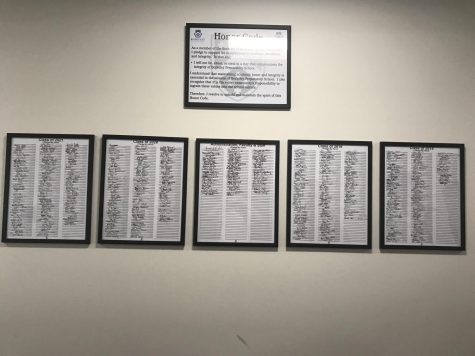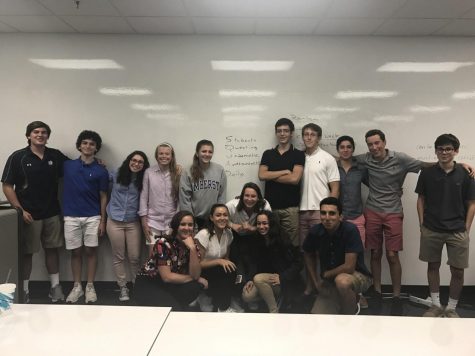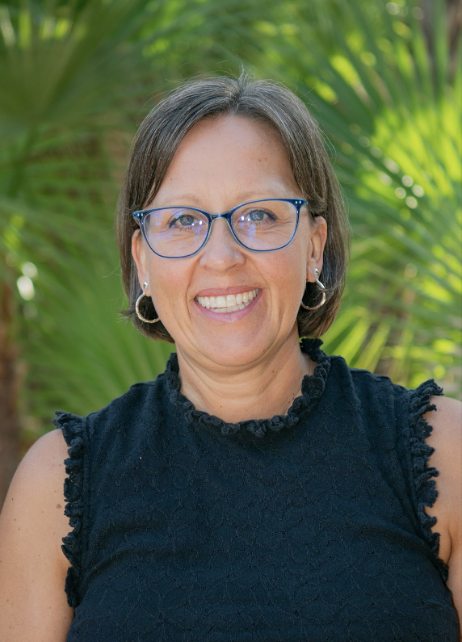The Honor Council: Familiar yet Foreign
Learn more about what the Honor Council really does
November 16, 2017
Since the honor code was developed 14 years ago, Berkeley students have been constantly reminded to uphold their honor. For most, upholding honor means signing their name next to “I pledge my honor” at the top of every assessment. However, for a select group of students, it means serving on behalf of their peers on the Honor Council.
The Honor Council is composed of four freshmen, four sophomores, three juniors and six seniors who are devoted to keeping Berkeley an ethical place. At weekly Wednesday meetings supervised by English teacher Tom Brandt, members brainstorm ways to popularize honor and integrity throughout Upper Division. The Honor Council also serves on about fifteen to twenty honor violation cases a year, in which the members and faculty determine whether the accused student is guilty of breaking the honor code.

FRONT AND CENTER: Every day in the Gries, students and faculty walk by the signed honor codes, reminding them of who they are and what they believe in.
The process of an honor case starts when Dean Ronnie Williams or Dean Justin Houston notifies Brandt that a student violated the honor code. Brandt then assigns five Honor Council members to accompany selected teachers, who act as additional voters, in the case.
A typical lunchtime case starts with the Dean’s presentation of the accused student’s honor code violation. Honor Council members and teachers then have the opportunity to ask the Dean questions. Next, the accused student enters the room with their advisor. At that point, the student has the chance to explain their actions before the council. Their advisor also speaks on their behalf. The student then leaves, and those present vote on whether or not the honor code has truly been broken. If a majority confirm the violation, the council meets again after school to agree on a disciplinary recommendation for the administration’s final decision. The administration usually agrees with the Honor Council’s recommendation. Information from honor violation cases is confidential: Honor Council members may not repeat what they hear outside of the room where the case is held.
To prevent possible strains on personal relationships, Brandt allows Honor Council members to opt out of a case if they are not comfortable trying an accused student. However, Frances Perez ’19, a third year honor council member, feels that her relationship with the accused students is beneficial as it allows her to “help them through the tough times and help them grow as a better person.”
Many students on Honor Council claim to get even more from the council then they put in. “What I’ve gotten out of it is a better and newer appreciation for the honor code,” said Lindsey Marian ’18.
Markus Bynum ’20 said,“[It is] fulfilling to help kids who make mistakes become more honorable and to create a better environment for learning.” Similarly, Caroline Davidson ’18 feels lucky to play a role in “fostering the unique, trustworthy community we are able to experience at Berkeley.”
In early October, freshmen Michael Casey ’21, Isabella Malmqvist ’21 and George Saba ’21 were elected to a two year Honor Council term. “I believe every school should have an honor council composed of students, because students can better relate to the person on the other side,” Saba said. “I, myself, wanted to be part of this relation.”
The Honor Council members are passionate about working their hardest each day to cultivate the most trustworthy school environment possible. While many colleges and high schools have honor codes, Brandt believes that Berkeley’s is special because “it actually makes an impact.”

THE 2017-2018 BERKELEY HONOR COUNCIL: (From left) Casey, Saba, Batia Friedman-Shaw ’18, Lindsey Marian ’18, Caroline Davidson ’18, Isabella Malmqvist ’21, Eleni Psaltis ’18, Nicole Stambo ’19, Frances Perez ’19, Dylan Sunjic ’20, Markus Bynum ’20, Gaby Fraifer ’18, Alex Shear ’20, Alex LeRoux ’20 and Haden Mazzuco ’18 pose together after their first lunch meeting of the year. (Missing: Justin Rudolph ’19)



